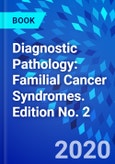- Contains all the information necessary to determine whether a neoplasm typically encountered in daily practice is sporadic or related to a familial cancer syndrome
- Features a revised structure to keep you up to date: Part I includes more than 80 detailed chapters describing diagnoses associated with familial cancer syndromes; Part II contains more than 70 chapters with detailed descriptions of major syndromes (cross-referenced with diagnoses); and Part III features a molecular factors index that includes a complete description of each known gene associated with a familial cancer syndrome
- Contains updated chapters with newly classified GI, neurology, multiple organ, eye, endocrine, GYN, and kidney tumors, as well as more than 20 entirely new chapters covering recently recognized syndromes
- Incorporates up-to-date molecular findings and their significance for familial cancer syndromes; new techniques and technologies being used to discover gene mutations and other alterations; and details on personalized medicine targeted to specific genes
- Features more than 2,200 images throughout, including clinical and radiological images, algorithms, graphics, gross pathology, histology, and a wide range of special and immunohistochemical stains-all carefully annotated to highlight the most diagnostically significant factors
- Features time-saving bulleted text, key facts in each chapter, an extensive index, and numerous tables for quick reference and thorough understanding - Includes the enhanced eBook version, which allows you to search all text, figures, and references on a variety of devices
Table of Contents
I. Diagnosis Associated With Syndromes by OrganBreast
Breast Carcinoma, Female
Breast Carcinoma, Male
Breast Table
Blood and Bone Marrow
Acute Lymphoblastic Leukemia and Non-Hodgkin Lymphoma
Acute Myeloid Leukemia and Myelodysplastic Syndrome
Blood and Bone Marrow Table
Bone and Soft Tissue
Chondrosarcoma
Chordoma
Malignant Peripheral Nerve Sheath Tumor
Osteosarcoma
Rhabdomyosarcoma
Schwannoma
Bone and Soft Tissue Table
Head and Neck
Endolymphatic Sac Tumor
Squamous Cell Carcinoma
Head and Neck Table
Salivary Glands Table
Endocrine
Adrenal Cortex
Adrenal Cortical Adenoma
Adrenal Cortical Carcinoma
Adrenal Cortical Neoplasms in Children
Primary Pigmented Nodular Adrenocortical Disease
Adrenal Cortex Table
Adrenal Medulla and Paraganglia
Adrenal Medullary Hyperplasia
Neuroblastoma
Pheochromocytoma and Paraganglioma
Adrenal Medulla and Paraganglia Table
Pancreas
Pancreatic Neuroendocrine Neoplasms
Pancreas Table
Parathyroid
Parathyroid Adenoma
Parathyroid Carcinoma
Parathyroid Hyperplasia
Parathyroid Table
Pituitary
Pituitary Adenoma
Pituitary Hyperplasia
Pituitary Table
Thyroid, Medullary
C-Cell Hyperplasia
Medullary Thyroid Carcinoma
Thyroid, Medullary Table
Thyroid, Nonmedullary
Familial Thyroid Carcinoma
Follicular Thyroid Carcinoma
Thyroid, Nonmedullary Table
Gastrointestinal
Tubular Gut
Colon Adenoma
Esophageal Adenocarcinoma
Esophageal Squamous Cell Carcinoma
Gastric Adenocarcinoma
Gastrointestinal Stromal Tumor
Hamartomatous Polyps of GI Tract
Small Bowel Adenocarcinoma
Colon/Rectum Table
Esophagus/Stomach/Small Bowel Table
Tubular Gut Table
Hepatobiliary and Pancreas
Biliary Tract Neoplasia
Hepatoblastoma
Hepatocellular Carcinoma
Pancreatic Adenocarcinoma
Biliary Tract/Liver/Pancreas Table
Hepatobiliary and Pancreas Table
Genitourinary
Bladder
Bladder Table
Kidney
Angiomyolipoma
Clear Cell Renal Cell Carcinoma
HLRCC Syndrome-Associated Renal Cell Carcinoma
Papillary Renal Cell Carcinoma
Renal Oncocytoma, Chromophobe, and Hybrid Tumors
Wilms Tumor
Kidney Table
Prostate
Prostate Table
Renal Pelvis and Ureter
Renal Pelvis and Ureter Table
Testicle
Germ Cell Tumor
Sertoli Cell Neoplasms
Testicle Table
Gynecology
Cervical Tumors
Fallopian Tube Tumors
Ovarian Tumors
Uterine Tumors
Cervix
Endometrium
Fallopian Tube
Ovary
Nervous System
Central Nervous System
Eye
Peripheral Nervous System
Pulmonary
Adenocarcinoma, Lung
Adenocarcinoma With Lepidic (Bronchioloalveolar) Predominant Pattern
Lymphangioleiomyomatosis
Neuroendocrine Carcinoma, Lung
Pleuropulmonary Blastoma
Lung Table
Skin
BAP1-Inactivated Melanocytic Tumor
Basal Cell Carcinoma
Cutaneous Melanoma
Cutaneous Squamous Cell Carcinoma
Sebaceous Carcinoma
Skin Table
II. Overview of Syndromes
Introduction
Pathology of Familial Tumor Syndromes
Clinical Diagnosis and Management of Familial/Hereditary Tumor Syndromes
Molecular Aspects of Familial/Hereditary Tumor Syndromes
Syndromes
Ataxia Telangiectasia
BAP1 Tumor Predisposition Syndrome
Basal Cell Nevus Syndrome/Gorlin Syndrome
Beckwith-Wiedemann Syndrome
Birt-Hogg-Dub? Syndrome
Bloom Syndrome
Brooke-Spiegler Syndrome
Carney Complex
Costello Syndrome
Cystic Nephroma Syndrome
Denys-Drash Syndrome
Diamond-Blackfan Anemia
DICER1 Syndrome
Down Syndrome
Dyskeratosis Congenita
Familial Acute Myeloid Leukemia and Myelodysplastic Syndrome
Familial Adenomatous Polyposis
Familial Chordoma
Familial Gastrointestinal Stromal Tumor
Familial Infantile Myofibromatosis
Familial Isolated Hyperparathyroidism
Familial Medullary Thyroid Carcinoma
Familial Nonmedullary Thyroid Carcinoma
Familial Paraganglioma-Pheochromocytoma Syndrome
Familial Testicular Tumor
Familial Uveal Melanoma
Familial Wilms Tumor
Fanconi Anemia
GATA2 Spectrum Disorders
Glucagon Cell Hyperplasia and Neoplasia
Hereditary Breast/Ovarian Cancer Syndrome: BRCA1
Hereditary Breast/Ovarian Cancer Syndrome: BRCA2
Hereditary Diffuse Gastric Cancer
Hereditary Leiomyomatosis and Renal Cell Carcinoma Syndrome (HLRCC)
Hereditary Multiple Exostosis
Hereditary Neuroblastoma
Hereditary Pancreatic Cancer Syndrome
Hereditary Papillary Renal Cell Carcinoma
Hereditary Paraganglioma/Pheochromocytoma Syndromes
Hereditary Prostate Cancer
Hereditary Renal Epithelial Tumors, Others
Hereditary Retinoblastoma
Hereditary SWI/SNF Complex Deficiency Syndromes
Heritable Gastrointestinal Stromal Tumors Syndromes
Howel-Evans Syndrome/Keratosis Palmares and Plantares With Esophageal Cancer
Hyperparathyroidism-Jaw Tumor Syndrome
Juvenile Polyposis Syndrome
Li-Fraumeni Syndrome/Li-Fraumeni-Like Syndrome
Lynch Syndrome
McCune-Albright Syndrome
Melanoma/Pancreatic Carcinoma Syndrome
Multiple Endocrine Neoplasia Type 1 (MEN1)
Multiple Endocrine Neoplasia Type 2 (MEN2)
Multiple Endocrine Neoplasia Type 4 (MEN4)
MYH-Associated Polyposis
Neurofibromatosis Type 1
Neurofibromatosis Type 2
Nijmegen Breakage Syndrome
Pancreatic Neuroendocrine Tumor Syndromes
*PDGFRA*-Mutant Syndrome
Peutz-Jeghers Syndrome
PTEN Hamartoma Tumor Syndromes
RASopathies: Noonan Syndrome
Rhabdoid Predisposition Syndrome
Schwannomatosis
Shwachman-Diamond Syndrome
Steatocystoma Multiplex
Succinate Dehydrogenase (SDH)-Deficient Renal Cell Carcinoma
Tuberous Sclerosis Complex
Tumor Syndromes Predisposing to Osteosarcoma
von Hippel-Lindau Syndrome
Werner Syndrome/Progeria
Wilms Tumor-Associated Syndrome
Wiskott-Aldrich Syndrome
Xeroderma Pigmentosum
Reference
Molecular Factors
Molecular Factors Index








